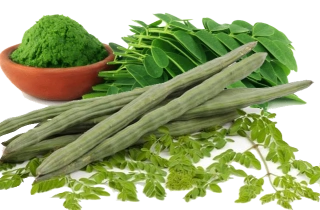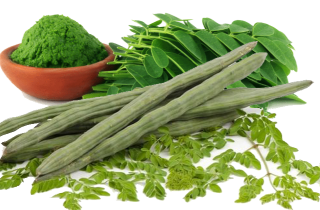Moringa powder benefits
Who shouldn’t take moringa powder
How to use it daily
Meet moringa oleifera. In its native India and Nepal, it’s known as “drumstick tree,” “miracle tree,” and “tree of life”; today it’s also grown in Africa, Latin America, and Asia and also goes by the “horseradish tree.”
Read Also: What are the health benefit of vegetables

And moringa powder, made from the leaves of the moringa tree, has as many aliases as it does scientifically-backed benefits and medicinal uses.
This superfood has been used as a traditional remedy in phytomedicine and ayurvedic healing for thousands of years. Here are the 10 best health benefits of moringa oleifera, plus our favorite ways to add this super green to your diet:
1. It’s nutrient-packed
Many of the healthy foods you eat have a single standout nutrient. Think carrots and vitamin A, citrus and vitamin C, nuts, and vitamin E.
Moringa leaves stick out as a superfood because one cup of chopped leaves is considered a good source of iron, calcium, vitamin C, vitamin B6, and riboflavin and has notable amounts of potassium, vitamin A, vitamin E, and magnesium.
In fact, the leaves are more concentrated in vitamin C than oranges. That means moringa can contribute to everything from better vision and immunity to bone health and skin radiance.
Read Also: Wealth or health?
2. It’s a super source of plant-based protein.
Whether you’re a vegetarian or just trying to cut down on meat, it’s not always easy finding convenient plant-based protein.
Sure, there are lentils and tempeh, but sometimes you just want a quick, no-cook add-in to sprinkle on smoothie bowls or add to soup.
where moringa comes in. Powders made from its crushed leaves are packed with protein—3 grams of protein per tablespoon, in fact—and have a leg up on legumes because they contain all the essential amino acids, necessary for muscle repair, energy production, and mood regulation.
3. It can help your sex life.
Stress can stress your sex life. It can throw hormone levels off, spiking cortisol, and decreasing dopamine to lower libido.
In animal studies, moringa has not only been shown to bring down cortisol levels, but it may also naturally boost testosterone levels, a known sex drive booster.
In one study, moringa extract worked to enhance sexual performance in stressed rats by suppressing cortisol and increasing testosterone.
Read Also: what are the health benefits of masturbation
4. It can balance hormones
Menopause can throw women’s hormones out of whack—and make them feel out of whack, but moringa may help. A study published in the Journal of Food and Science Technology found that postmenopausal women who took a combination of moringa leaf powder and amaranth leaf powder for three months not only had decreased markers of oxidative stress, but they also had better fasting blood glucose and increased hemoglobin levels, which could mean more balanced hormones.
Moringa has also been linked to improved thyroid health, which controls hormones related to energy, sleep, and digestion.
5. It protects the liver
Think of your liver as the body’s detoxifier. It filters the blood, detoxifies chemicals, and metabolizes fat—and moringa may help it work better. First off, moringa contains high concentrations of polyphenols to reverse oxidation in the liver, and preliminary research has shown moringa consumption to reduce liver fibrosis and protect against liver damage.
6. It fights free radicals
Free radicals are created by things like pollution, fried food, and sun exposure. They damage your cells by robbing them of an electron, causing oxidative stress, cell damage, and premature aging.
The antidote: antioxidants, like the flavonoids, polyphenols, and ascorbic acid found in moringa. A diet rich in antioxidants has been shown to prevent premature wrinkles and possibly make you live longer.
7. It fights inflammation
Move over, turmeric, there’s a new inflammation-fighter in town. Moringa has been shown to significantly lower inflammation in cells.
As well as containing inflammation-lowering polyphenols and isothiocyanates, moringa reduces inflammation by suppressing inflammatory enzymes and proteins in the body. Take that, diabetes, cardiovascular disease, and cancer.
Read Also: Physical health education deals with what??
8. It balances blood sugar
Spikes in insulin and blood sugar levels can cause mood swings and sugar cravings and even lead to the development of type 2 diabetes and obesity. Enter moringa.
The leaf powder has been effective at reducing lipid and glucose levels and regulating oxidative stress in lab studies. One clinical study also showed therapeutic antioxidant properties as well as lower fasting glucose levels in postmenopausal women who took a supplement with moringa, and amaranth leaves for three months. One animal study even showed that moringa in the diet could help reduce weight gain and insulin resistance.
9. It improves digestion
Moringa leaf powder contains about 30% fiber, most of it insoluble, something you not only need for digestion but that may also reduce your risk of disease.
Moringa is a natural antibiotic and antibacterial and may help inhibit the growth of various pathogens that can cause digestive upset.
Moringa’s anti-inflammatory properties have been shown to help with digestive disorders, like colitis; plus, a recent study in mice found that it may improve gut bacteria.
10. It supports brain health
It’s estimated that one in eight people over the age of 65 have Alzheimer’s disease. Moringa leaf is high in vitamins C and E, which combat the oxidative stress associated with Alzheimer’s.
Animal studies of both Alzheimer’s and dementia are showing promising results. More good news: Moringa has also been linked to increased dopamine and serotonin (“happy hormones”), and with more research, it could possibly be used to help treat depression in the future.
Who shouldn’t use moringa?
Moringa might be unsafe for pregnant women or nursing mothers to use due to the chemicals possibly found in the root, bark, or flowers of the plant; studies show consuming these parts of the moringa plant may cause the uterus to contract.
Otherwise, the leaf powder had been deemed safe in human studies, even in larger doses than normal. You’ll also want to stay clear of moringa seeds and moringa seed extract consumption, as they have shown a level of toxicity in immune cells.
Moringa can have a laxative effect when consumed in large quantities or lead to stomach upset, so we suggest starting with a small dose—½ to 1 teaspoon per day.
How to use moringa powder
Made from dried and ground moringa leaves, the powder has a mild flavor with a slightly earthy taste, so it works well with many different recipes.
Moringa powder is easy to find online and in healthy grocery store chains. Try Kuli Kuli Pure Organic Moringa Vegetable Powder or Kiva Organic Moringa Leaf Powder.
Read Also: What are the importance or the health benefits of taking honey and garlic
Add it to your morning green smoothie
For lunches or other meals, it can also be sprinkled into hummus, guacamole, soups, salads, avocado toast or sweet potato toast.
Try baking it in to treats like zucchini bread, or mixed into your favorite energy balls.
Finally, use the powder like matcha and whisk it into hot water for a caffeine-free coffee substitute.
Moringa-infused teas are also common (try Traditional Medicinals Organic Moringa With Spearmint & Sage or Republic of Tea Organic Moringa SuperHerb). It’s even been showing up in the chip aisle (try Vegan Rob’s Moringa Puffs).




